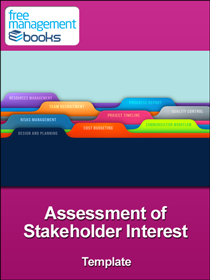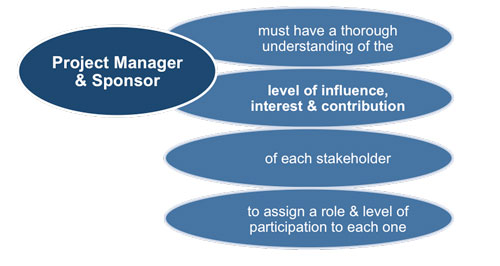
Assessment of Stakeholder Interest Template
This stakeholder interest template enables you evaluate who needs to involved in your project and identify your key stakeholders.
This stakeholder interest template enables you evaluate who needs to involved in your project and identify your key stakeholders. Once this information has been collected, the project manager can decide the most appropriate level of participation and what role each stakeholder should play as part of the planning, development, implementation and acceptance. Such analysis will highlight any issues, problems or barrier that may exist between stakeholders.
One of the key principles of project management is thoroughness and preparation from its inception and during its planning. Successful projects have spent sufficient time planning and assessing all facets of a project. The more effective your data gathering is and the more systematic your planning is the better you will be able to monitor and manage your project to a successful completion.
An essential part of this preparation is your ability as project manger to have as full an appreciation as possible of the expectations and motivations for the key supporters and champions of your project as possible. Once you have this knowledge base you can begin to formulate how each of these individuals needs to be managed so that their expectations of the project are realistic. It is your role to educate them on what is realistic to expect from your project.

Building up a sound working relationship in this arena between yourself and the champions takes time, but the real key to establishing such a rapport is information and understanding. The more you are able to demonstrate a true empathy and appreciation of their environment and needs the more effective such connection will be.
For any project manger understanding who the stakeholders are is a vital element to their success and our free template, ‘Assessment of Stakeholder Interest’, is designed to ensure that you are able to gather as much information as you can to give you a thorough understanding of the motivations of your projects stakeholders. It will also help you evaluate who needs to involved in your project and identify those who are not appropriate as a stakeholder for this project.
Once all the data has been collated you, as the project manager, will liaise with your project sponsor to decide who is essential to the projects success. Together you will agree which of the individuals you have identified needs to be a stakeholder of your project. Then you work through this list and assign an appropriate level of participation for each of them and define exactly what role each stakeholder should play as part of the planning, development, implementation and acceptance of the project.
As you conduct this research you will draw out any issues, problems or barrier that may exist between stakeholders. Such findings may cause you to re-assess a particular stakeholders role and level of participation. You may have little choice in retaining a stakeholder that you foresee causing problems because of the nature of your project and that individual’s role within the organization. But what you can do as a result of this detailed research is make a judgement as to what future actions or communications you may need to take to minimize disruption to the project.
Our template’s tabular format enables you to have a visual representation of how stakeholders’ interests and benefits in the project match or conflict with each other. This allows you to group stakeholders in a logical way for communications. You can also begin to identify potential roles they could perform in the project and match these to the attributes and expertise they bring to the project. This will also help you to identify potential issues and assess the risk to the project these could pose and how you could counteract them to ensure the project’s success.
